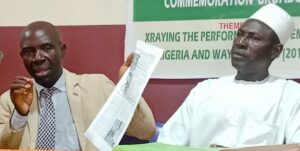

By Dada Ahmed in Lokoja.

The office of Amnesty International in Kogi State has urged the Federal Government to cut down on political spending, particularly during elections, and focus more on diversifying the nation’s economy.
Amnesty International gave the advice on Friday at the NUJ Press Centre in Lokoja, through its director in the state,Mr.Sunday Jattso,during a press conference convened to assess the state of democracy in Nigeria and chart the way forward.
The international organization expressed concern that while billions of naira are often spent on electioneering,among other politically induced cost,the nation’s economy,crucial for driving sustainable social and economic development,still lacks the desired diversification.
The Amnesty International Director urged the government to begin economic diversification with the tourism sector, noting that its success would have a tremendous impact on the nation’s economy.
Citing several untapped historical sites in Kogi State, to buttress the point,Jatto noted that Nigeria’s tourism sector holds greater economic potential than oil and gas, adding that if properly developed, it could significantly enhance the nation’s revenue and strengthen the economy.
He said that with a well-developed tourism sector, like those in Kenya and other African countries, Nigeria could attract foreign tourists and international investors who would contribute significantly to the nation’s economic development.
On the health sector, the international organization stressed the need for the Tinubu administration to intensify research into herbal medicine, with a view to producing affordable, high-quality local drugs and reducing the nation’s dependence on imports.
Jatto, who described Nigeria’s land as among the most fertile in the world, urged the government to leverage this advantage by pursuing an increased and robust agricultural economy to boost food production, curb hunger, tackle insecurity, and drive development.
On democracy, Amnesty International called on the executive arm of government in the country to democracy as a government of the people,by the people and for the people and not to see it democracy as a personal belonging.
According to its website,Amnesty International was founded in 1961 by British lawyer Peter Benenson after his call to free people imprisoned for their beliefs.
Initially focused on “prisoners of conscience,” it later expanded to address torture, the death penalty, women’s rights, refugee protection, and other human rights issues.
With over 10 million members in more than 150 countries, it has earned global recognition, including the Nobel Peace Prize in 1977, and remains one of the world’s leading human rights organizations headquartered in London.

